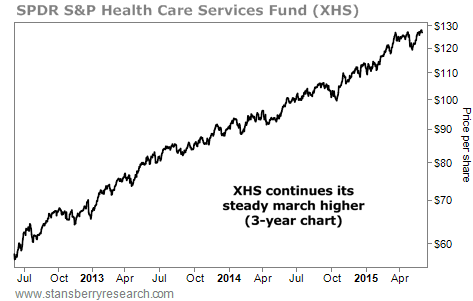| Home | About Us | Resources | Archive | Free Reports | Market Window |
The Dumbest Man in ChinaBy
Thursday, June 4, 2015
You can't make this stuff up...
"Stephen Qin, a 28-year-old office worker in northern China, traveled 1,000 miles and set up an account in Hong Kong... to trade Chinese stocks he could have bought at home," Bloomberg news reported this week.
His logic? "I can make more money if I can borrow more."
You see, Qin can borrow more money in Hong Kong to buy stocks than he can in China. (This is called buying on margin.) He also gets a lower interest rate in Hong Kong on that borrowed money.
Qin is not alone...
Thousands of Chinese investors are making the same "pilgrimage" to Hong Kong to open up brokerage accounts for the same reasons as Qin.
The Hong Kong brokerage firms are loving the influx of new business from mainland-Chinese investors. They are offering all kinds of incentives, including covering up to HK$10,000 of the travel costs from China for people opening accounts.
It's like a bizarre form of Las Vegas – where "the house" makes you feel good by comping your room... as long you spend money in its casino.
The story gets even more ridiculous...
Qin is excited about sitting at his computer in China and buying Chinese stocks through his Hong Kong brokerage online. For example, he recently bought Chinese shares of China Construction Bank. The thing is, the identical shares of China Construction Bank are 7% less expensive in Hong Kong than they are in China.
Qin drove 1,000 miles to Hong Kong... but instead of buying China Construction Bank shares that trade in Hong Kong, he bought the identical shares trading in China that were 7% more expensive!
As Qin's story shows, individual investors in China have lost all sense of reality...
The boom has finally reached the crazy stage. Just like in the U.S. housing boom a few years ago (that ended so badly), investors like Qin believe "I can make more money if I can borrow more."
Qin – and tens of thousands of other investors – will likely face the same fate American investors did in the housing bust.
The craziest part is, I'm not selling Chinese stocks yet...
The boom can (and likely will) get crazier before it's all over.
It will end – badly – at some point. A 50% fall would be nothing.
I just don't think we've hit the peak yet.
The difference between us and Mr. Qin is, we know that we are playing a game of chicken. We know that it will end and that Qin, with his borrowed money, will be wiped out.
Qin's story shows that Chinese stocks are reaching mania stage... but there could be much more fun ahead.
So we're not selling yet.
Good investing,
Steve
Further Reading:
"Hundreds of billions of dollars will flow into Chinese stocks in the next two or three years," Steve writes. "So even though Chinese stocks are up a lot, your upside potential is still dramatic." Get all the details here.
Recently, Steve called attention to a "glitch" in Chinese stocks that could reward investors. Learn why he is calling this opportunity "the biggest anomaly in finance" here.
Market NotesTHIS QUIET, STEADY TREND KEEPS GOING Today's chart looks at one of the steadiest uptrends in the stock market... the "picks-and-shovels" of healthcare.
Regular readers know we're proponents of investing in "picks-and-shovels" companies to profit from sector and commodity booms. Picks-and-shovels providers don't bet the company on one project... They sell vital goods and services to an industry (read our educational interview about it here).
As we've covered many times, the health care industry is booming right now. The Baby Boomer generation is increasing its health care consumption. Plus, Obamacare is boosting demand. This is great for investment funds like the SPDR S&P Health Care Services Fund (XHS). It holds a diversified basket of picks-and-shovels providers to the health care industry.
As you can see below, business is booming. XHS is up nearly 130% in the past three years... and it just reached an all-time high. What's even more remarkable about the trend in XHS is its low level of volatility. Despite the big rise, XHS has been 29% less volatile than the overall stock market over the past year. It's one of the steadiest trends in the market today.
 |
Recent Articles
|



